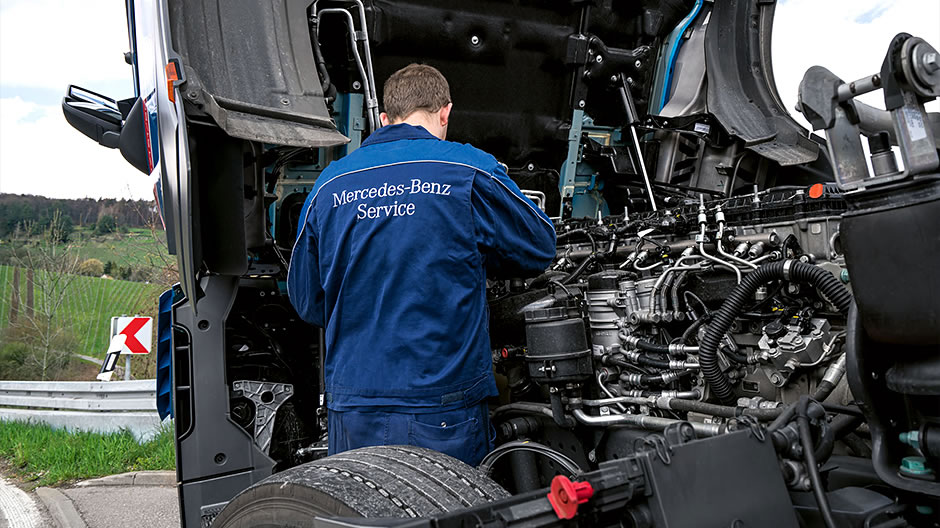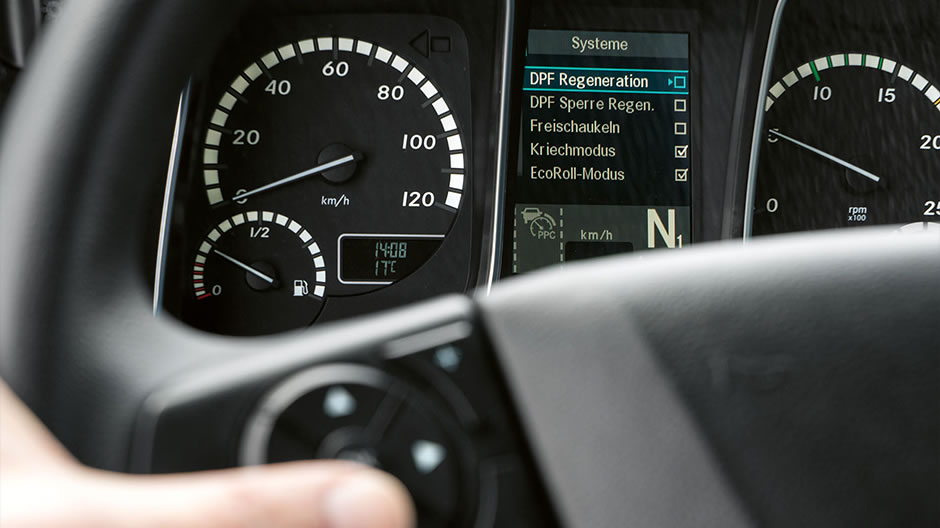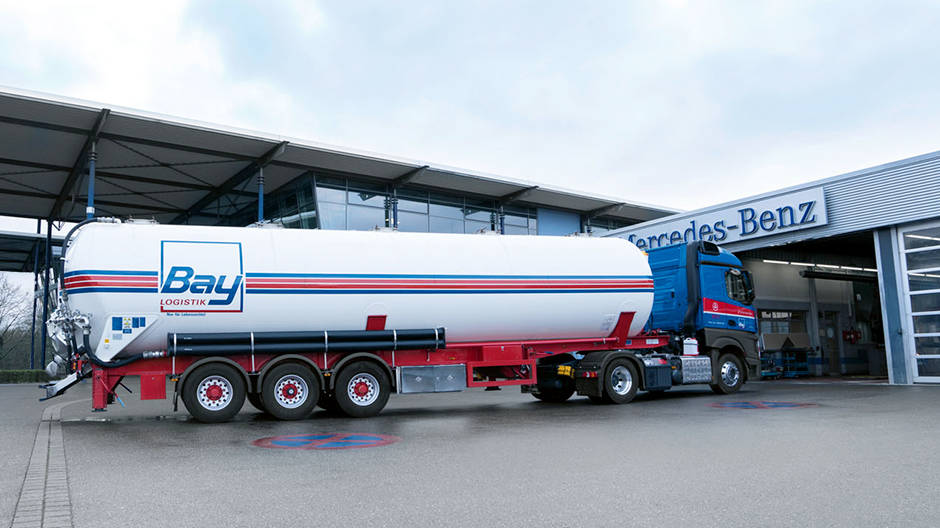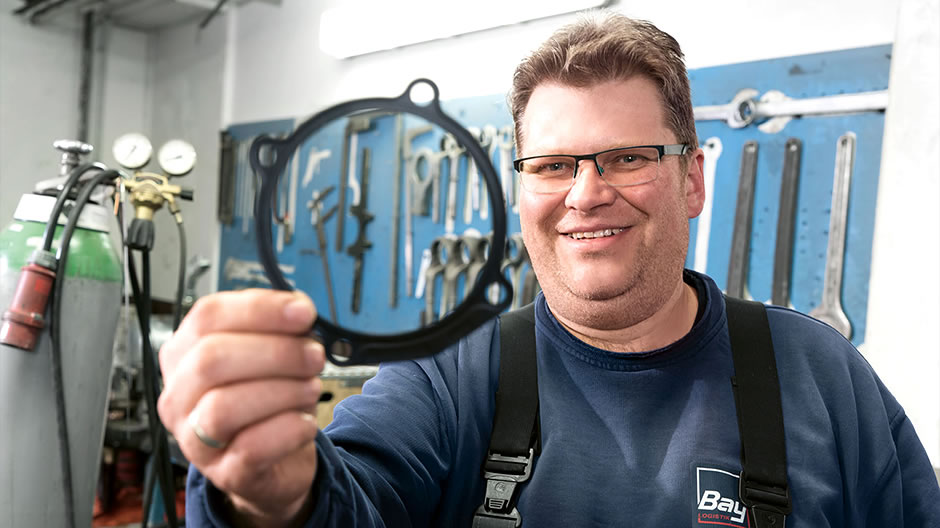
RoadEfficiency: high vehicle usage with Mercedes-Benz Uptime
Economics & Logistics
The new Mercedes-Benz Uptime service informs customers remotely about the technical state of their trucks and gives them specific recommendations about what to do. This maximises vehicle availability – “breakdowns” are avoided, and repairs and maintenance can be better planned, as the example of the Bay haulage firm shows.

Traditional top performance. Brothers Markus and Michael Schaaf about their family business with Swabian virtues: "Low overall costs, high safety and maximum vehicle availability are essential in our business."
Bay Logistik from Waiblingen near Stuttgart deals with more than 35,000 freight orders per year for the chemical industry. The trucks of the family-run company from the south of Germany shift approximately 600,000 tonnes and travel about 25 million kilometres. The 200-strong staff of Bay pursue a common goal day after day: satisfied customers.
Amongst them there are many discerning customers from the chemical industry: seven out of ten of the biggest manufacturers in the business trust Bay Logistik's reliability. There are also a large number of small and family-run chemical businesses.
The constantly growing supply comprises transportation and storage of fluid and granular chemicals – both bulk and packaged. To accomplish this, they draw on a fleet of 700 units. It consists of 120 Mercedes-Benz tractor units and a portfolio of different silo trailers, pressurised containers and tank trailers.
The work of Bay Logistik is largely determined by the increasing concentration of production plant facilities and a reduction in costly warehouse capacity in the chemical industry. The experts often transport huge quantities of expensive raw materials. If a single truck is out of action, in the worst case this can bring the production of a huge chemical works to a halt. For the managers of Bay this means that maximum availability of the vehicles in use is crucial.
In order to increase this availability, Sascha Schmieder, the head of fleet administration, and his staff have been using the new Mercedes-Benz Uptime service for a year and a half as part of a pilot project. He explained to "Mercedes-Benz Transport" how the system works and how useful it is, with the help of three reconstructed examples from practice.
Sascha Schmieder, head of the fleet, said about Mercedes-Benz Uptime:
"It's a bit like Formula One racing: the pits know there's
something wrong with the truck before the driver does – intelligent
evaluation of the diagnostic data is often the key to success. That
applies to Mercedes-Benz Uptime too. The service informs me about the
technical health of our tractor vehicles. Just a few minutes after the
malfunction has come up in the truck, I receive information about what
has happened. Also, I'm given information about the anticipated
vehicle reactions, for example a loss of performance or a reduction in
speed, and also a recommendation for solution-oriented action. This
early information gives me the time normally needed to prevent a truck
from breaking down, so the freight can be delivered on time and
unnecessary expenses avoided."
This is how it works.
All maintenance and repair work which does not need to be carried out immediately can be done more efficiently thanks to Mercedes-Benz Uptime. This includes recurring maintenance tasks such as replacing brake linings, lubricants or filters, and also malfunctions in the luxury functions such as the air-conditioning system.
Mercedes-Benz Uptime sends relevant information automatically to the Mercedes-Benz service partner chosen by the customer. The service partner combines the upcoming repair and maintenance work, based on all the data, actively contacts the customer and arranges in good time an appointment which best fits in with the planned trip and the required maintenance work. This reduces the number of trips to the workshop and thus keeps downtime to a minimum, thus increasing the availability of the vehicle.
Also, Mercedes-Benz Uptime clusters information on the parameters which neither affect the function of the vehicle nor make subsequent repairs necessary. This includes information about the times when a vehicle is not being used effectively by a driver. This can optimise the fleet manager's options to give a driver precise feedback and if necessary to ensure improvements.

Breakdown avoided. A sensor that was not working properly triggered an error message in the truck. Truck mechanic Sebastian Übele from the Autohaus Lorinser workshop was able to supply Jan Hettling's truck with the necessary spare part before the truck would have come to an unplanned standstill.
The fleet manager said:
"With Mercedes-Benz Uptime we receive precise information
and the time to find a solution before anything goes wrong with the
freight job. I remember a case where one of our trucks displayed a
malfunction. But the spare part was not available at the nearest
workshop. As we had loaded goods subject to a deadline, the spare part
was sent to the workshop in Frechen. The truck was able to continue
the journey there. When it arrived in Frechen, the spare part was
already there. The repair only took two hours, and the goods reached
the customer on time. Another time I got a call from the CAC about a
malfunctioning boost pressure and temperature sensor. The lady from
the emergency service was highly competent and suggested a variety of
solutions. In the end, we were able to replace the sensor at our local
workshop close by without any delays."




This is how it works.
The diagnostic software of the trucks reports a problem, which the driver can solve quickly if he knows exactly what the problem is and what he has to do to remedy the situation. For example, a manual regeneration of the diesel particulate filter might be necessary, or an underinflated tyre might need more air.
The events and the driver's reactions are collated by Mercedes-Benz Uptime and passed on to the people responsible for the fleet via the online customer portal and by e-mail. The Mercedes-Benz Uptime online portal brings hidden problems to light and shows potential breakdown risks in good time.
Using more potential – FleetBoard transport management.
Efficient communication with the driver now means more than just a simple phone call. Transport management solutions from FleetBoard help to simplify processes and minimise the need for coordination. Fleet managers who monitor their trucks via FleetBoard can plan their orders directly on the computer, put together the best tours and send them to the drivers' DispoPilots with the press of a button, together with all the relevant additional information. Status messages can be configured flexibly and individually depending on the transport task and help the driver to enter information specifically for an order, trip or package.
The complete transport process is effectively managed through the smooth exchange of information. The FleetBoard WebServices also allow FleetBoard Transport Management to be seamlessly integrated into the internal company software. The data entered by the driver can then be further processed directly where it is needed. This all prevents unnecessary waiting and minimises errors, so that truck and driver can spend as much time as possible driving and transporting.
The fleet manager said:
"The information
we get from Mercedes-Benz Uptime to prevent malfunctions and
unnecessary maintenance time lost at the workshop are invaluable. One
of our drivers recently had an error message on his display that
indicated problems with the exhaust gas aftertreatment. In this case
the truck might be automatically limited to 25 km/h because the
emission values are no longer within the legal limits. We were
notified by the CAC that the driver could manually regenerate the
diesel particulate filter in the cockpit, we instructed him
accordingly, and the freight order was unhindered. With the help of a
compact overview of messages from Mercedes-Benz Uptime with reference
to each individual vehicle, we can also react much sooner and better
to encroaching malfunctions – which saves us money. If, for example, a
number of drivers have to reinflate a tyre on one and the same
vehicle, this indicates the risk of a dangerous and expensive flat
tyre or blow-out. I find out about this and can remedy the situation."


This is how it works.
All maintenance and repair work which does not need to be carried out immediately can be done more efficiently thanks to Mercedes-Benz Uptime. This includes recurring maintenance tasks such as replacing brake linings, lubricants or filters, and also malfunctions in the luxury functions such as the air-conditioning system.
Mercedes-Benz Uptime sends relevant information automatically to the Mercedes-Benz service partner chosen by the customer. The service partner combines the upcoming repair and maintenance work, based on all the data, actively contacts the customer and arranges in good time an appointment which best fits in with the planned trip and the required maintenance work. This reduces the number of trips to the workshop and thus keeps downtime to a minimum, thus increasing the availability of the vehicle.
Also, Mercedes-Benz Uptime clusters information on the parameters which neither affect the function of the vehicle nor make subsequent repairs necessary. This includes information about the times when a vehicle is not being used effectively by a driver. This can optimise the fleet manager's options to give a driver precise feedback and if necessary to ensure improvements.
The fleet manager said:
"The consolidated
Mercedes-Benz Uptime reports we receive about each of our vehicles are
extremely valuable. Thanks to the detailed information on the general
state of health and the upcoming servicing requirements, I can replace
potential breakdown candidates in good time or send them to the
workshop before expensive repairs become necessary. Also, the service
helps us to monitor our standards of cost-effective driving. It's a
real competitive advantage. The drivers, too, are very happy with
Mercedes-Benz Uptime. Unplanned downtimes are by and large a thing of
the past. And if a visit to the workshop is necessary after all, then
everything is fully prepared and the whole job is swift and efficient."






Comment
Please log in to post a comment.
No comments yet